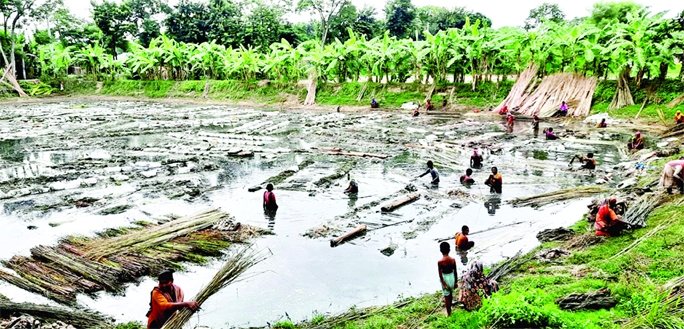
Ishwardi (Pabna) Correspondent :
The farmers of Ishwardi are in trouble with golden fiber jute. Due to the lack of water, the jute cannot wake up. There is no rain even in full monsoon season. There is no water in most of the canals, banks, ponds and reservoirs this time. The farmers said that the amount of water is not enough to rot the jute. Expected rain is not falling even in full monsoon season. The Ishwardi Meteorological Office said that there has been no such low rainfall in the month of Ashad-Shravan in the last 42 years. The Meteorological Office also said that the average rainfall in Ishwardi during June-July 2021 was 11.75 mm. And in 2022, the average rainfall was only 2.55 mm in two months. In other words, as a percentage, compared to last year, only 21 percent of rain has been received this year.
Able farmers are arranging jute raising by irrigating ponds with shallow machines. Poor farmers are not able to harvest jute from the land due to lack of water. The jute is getting destroyed in the land. Many have cut the jute and left it on the ground hoping for rain. Many are waking up by burying sandbags in knee-deep water in ponds, canals and reservoirs next to houses or roads to decompose jute. Images that can be seen in different areas of Ishwardi. Before this, most of the jute land was cultivated with sugarcane. Due to the closure of Pabna sugar mill, farmers are now cultivating jute on sugarcane land. Jute cultivation has increased in Ishwardi due to the closure of sugar mills and the high price of jute in the market. Meanwhile, due to lack of water, the planting of Aman is also delayed. Jute was cut and Aman rice seedlings were planted in that land. The agriculture office said that there is a risk of a decrease in the yield of aman if the planting is delayed.
Rafiq Molla, a farmer of Bhatapara, said that he cultivated jute on three bighas of land. Yields have been good; But this time, as there is no water, I am forced to wake up the jute by burying sandbags in knee-deep water. Because of this, fishes in the pond died.
Farmer Amjad Hossain of Lakshikunder union said that this year he has cultivated jute on 4 bigha land. Yields have also been good; But due to lack of water, jute can’t wake up. Due to high price of jute last year, the farmers of the area are leaning towards jute cultivation this year. Even though the jute plantation has been smooth, now I am in great trouble with jute cutting and raising. As jute fields are still not cut due to lack of water, planting of Aman saplings is also delayed. We are in dire straits in this situation.
Ishwardi Upazila Agriculture Officer Mita Sarkar said that the jute plantation has increased more than before due to the closure of the Pabna sugar mill. This year jute cultivation has been done on 380 hectares of land in the upazila. A lot of jute still remains in the land due to lack of water to raise the jute. Farmers are in dire straits. It has been asked to wake up the jute in the government Jalmahal. Stating that planting of Aman seedlings is delayed, he said, if Aman paddy is not cultivated on time, there is a possibility of affecting the production.

